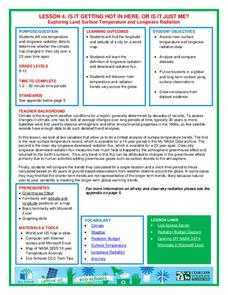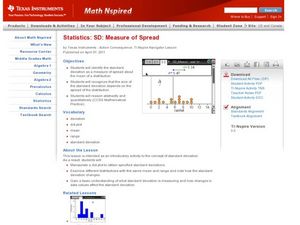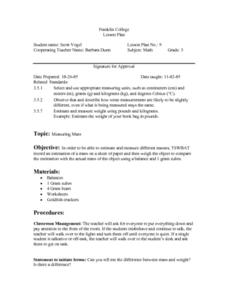Cornell University
Non-Newtonian Fluids—How Slow Can You Go?
Children enjoy playing with silly putty, but it provides more than just fun. Young scientists make their own silly putty using different recipes. After a bit of fun, they test and graph the viscosity of each.
National Wildlife Federation
Climate Solutions – A Call to Action!
The final lesson in the 21-part series on climate change focuses on energy solutions to the consumption problem. Using data specific to their school, pupils make recommendations, follow up on actions, and carefully track progress....
National Wildlife Federation
Is It Getting Hot in Here, or Is It Just Me?
Currently, only 2.1% of global warming is felt on continents, while over 93% is felt in the oceans. The fourth lesson in the series of 21 on global warming is composed of three activities that build off one another. In the first...
Consortium for Ocean Science Exploration and Engagement (COSEE)
Ocean Acidification: Whats and Hows
Open this lesson by demonstrating the production of acidic carbon dioxide gas by activated yeast. Emerging ecologists then experiment with seashells to discover the effect of ocean acidification on shelled marine organisms. They measure...
Curated OER
Triangle's Interior Angles
Given a pair of parallel lines and a triangle in between, geometers prove that the sum of the interior angles is 180 degrees. This quick quest can be used as a pop quiz or exit ticket for your geometry class.
Institute of Electrical and Electronics Engineers
Get Connected with Ohm's Law
Ideal for your electricity unit, especially with middle schoolers, this lesson plan gets engineers using multimeters in electrical circuits to explore the relationships among voltage, current, and resistance. Older learners may even plot...
LABScI
Harmonic Motion: Pendulum Lab
Several times throughout history, groups of soldiers marching in rhythm across a suspension bridge have caused it to collapse. Scholars experiment with pendulums, resonance, and force to determine why this would happen. First, pupils...
Carnegie Mellon University
International Perspectives to Climate Change 2
A couple PowerPoint presentations are used to stimulate discussion about the perspectives of different countries on the issue of energy consumption. Afterward, they play a game in which each team is assigned a country, considers its...
Institute of Electrical and Electronics Engineers
Rotational Equilibrium
Physics stars design mobiles that demonstrate rotational equilibrium. They take measurements and solve related equations for force by graphing, substitution, or determinants. This is a well-developed lesson plan, complete with student...
Curated OER
Perimeter
Students study about perimeter and the units used to measure perimeter using a variety of materials including their hands, feet, rulers, and computer applets. They understand such attributes as length, area, weight, volume, and size of...
Curated OER
Measurement Mania
First graders measure 10 different objects found in the classroom, including their own hands and feet, then record their findings. This is a fun lesson for students to experience measurement using a ruler and unifix cubes.
Teach Engineering
Magnetic Fields Matter
Help your young scientists learn which materials are affected by magnetic fields with an activity that presents the information about different types of materials — diamagnetic, paramagnetic, and ferromagnetic — and their interaction...
Curated OER
Pancakes, Pancakes (Elementary, Science)
Read Pancakes for Breakfast by Tomi De Paola then participate in different activities which practice skills such as English language development, using non-standard measurement, fine motor skills, dramatic play, and using our five senses.
Curated OER
Learning to Measure with Ladybug
Students practice measuring items with non standard units. In this units lesson plan, students measure shapes, lengths, and classroom objects.
Curated OER
Measuring Mania
Second graders turn into measuring maniacs with this activity! With real world objects, 2nd graders practice measuring accurately to the nearest inch and centimeter. After a lecture/demo, students practice with a worksheet imbedded in...
Curated OER
Measure of Spread
Students identify the standard deviation. For this statistics lesson, students find the mean distribution and calculate the percent of deviation from the mean. They observe this change on the Ti calculator.
Curated OER
Whatcha Gunna Do When the Hulkster's Measuring Too??
Students measure using tools they have made. In this algebra lesson, students measure the height and distance using non-traditional measuring methods. They apply their findings to algebra and trigonometry properties of measurements.
Curated OER
Measuring for Perimeter
Third graders find the perimeter of a polygon. In this measurement activity, 3rd graders use yardsticks to measure straight-lined objects to the nearest 1/2 inch. Student choose a "mystery object," find the perimeter, and record it on...
Curated OER
Measuring Mass
Third graders engage in a lesson that is concerned with the estimate and approximation of different masses. They weigh different objects and compare the different measurements and then use a balance to compare them. Students define the...
Curated OER
How Big is a Foot?
First graders practice nonstandard measurement and estimating and measuring lengths of objects.
Curated OER
Comparison of Two Different Gender Sports Teams - Part 1 of 3 Measures of Central Tendency
Young scholars gather and analyze data from sports teams. In this measures of central tendency lesson, students gather information from websites about sports team performance. Young scholars analyze and draw conclusions from this data....
Coastal Carolina University
Osmosis and Diffusion Lab: Honey I Blew Up the Bear
Beginning biologists explore passive transport through two demonstrations and a hands-on inquiry. Spray air freshener from one spot in the classroom and have class members raise their hands as the scent reaches them. Also, place a teabag...
Curated OER
"How Do You Measure Up?"
Fourth graders explore basic measurements by analyzing their own bodies. In this human anatomy lesson, 4th graders identify the units used to measure a human body such as centimeters, inches, ounces and pounds. Students complete a...
Curated OER
Symmetry in Paper Airplanes
Young scholars explore symmetry. In this geometry and scientific inquiry lesson, students design paper airplanes with middle line symmetry, as well as right, obtuse, and acute angles. Young scholars measure the plane's angles...























